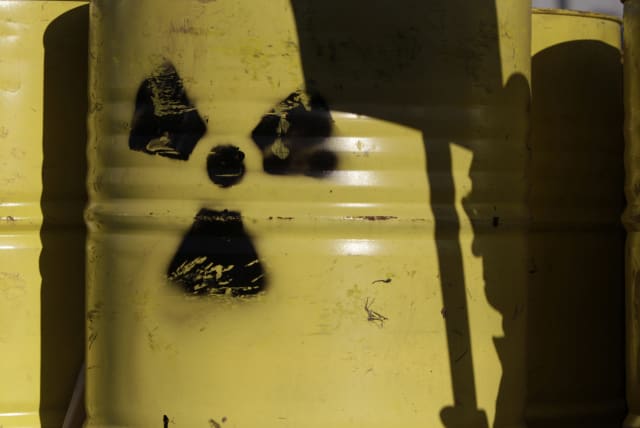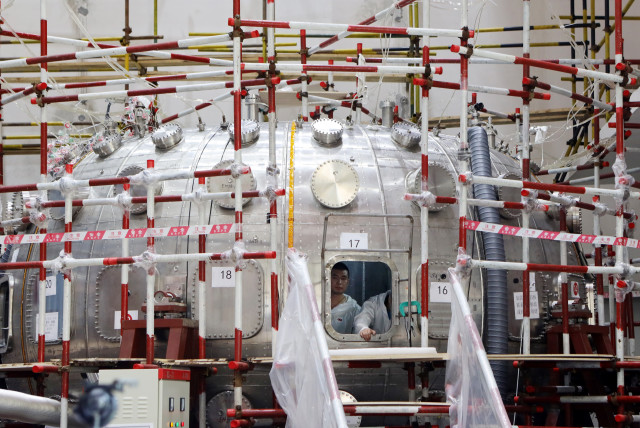Nuclear arsenals grow as global arms race takes shape - analysis

The increase in nuclear arsenals has raised eyebrows in the Middle East and other regions. Iran is pursuing nuclear weapons and continues to enrich uranium.
A report by the Stockholm International Peace Research Institute (SIPRI) said on Monday that “the number of operational nuclear weapons started to rise as countries’ long-term force modernization and expansion plans progressed.”
The increase in nuclear arsenals has raised eyebrows worldwide, as well as in the Middle East, particularly with Iran pursuing nuclear weapons and continuing to enrich uranium.
According to the report, there are nine countries with declared nuclear arsenals around the world. Unlike right after the Cold War when some believed that nuclear arms races were a thing of the past, today, countries are modernizing nuclear arsenals. On the one hand, this may make the arsenals more safe because there is more of an ability to monitor. However, it is becoming increasingly clear that there is also a potential for an arms race, as the US seeks to confront near-peer rivals such as Russia and China and as countries weigh how to deal with Iran’s nuclear program.
“Of the total global inventory of an estimated 12,512 warheads in January 2023, about 9,576 were in military stockpiles for potential use – 86 more than in January 2022,” the SIPRI report reads. “Russia and the USA together possess almost 90 percent of all nuclear weapons.”
China's nuclear arsenal
The report also examined China’s nuclear arsenal, which has increased from some 350 estimated warheads to 410. “Depending on how it decides to structure its forces, China could potentially have at least as many intercontinental ballistic missiles (ICBMs) as either the USA or Russia by the turn of the decade,” the report reads. “In 2022, France continued its programs to develop a third-generation nuclear-powered ballistic missile submarine (SSBN) and a new air-launched cruise missile, as well as to refurbish and upgrade existing systems.”
The report about China’s expanded arsenal has raised eyebrows specifically in Turkish state media. It is clear that as China seeks more inroads in the Middle East – like meetings in Saudi Arabia this week – that there will be more focus on how it stacks up militarily against the West.
Increased tensions in the Pacific and around Taiwan play into this as well. On the other side, China and Iran are working together, with Iran gambling on the theory that a rising China will be the major player in the world, displacing the US.
The Gulf is paying attention to the rise of China. Saudi Arabia, for instance, “announced on Sunday billions of dollars in investment deals between China and the Arab world, on the first day of the Arab-China business conference in Riyadh,” according to Al-Arabiya. “The meeting comes amid growing commercial and diplomatic ties between Beijing and Middle Eastern countries, including a recent landmark Chinese-brokered rapprochement between powerhouses Iran and Saudi Arabia that has shifted regional relations.”
Nuclear weapons were once believed to be a kind of anachronism. Today, the SIPRI report clearly indicates that nuclear weapons are again in the spotlight as countries modernize their forces.
Jerusalem Post Store
`; document.getElementById("linkPremium").innerHTML = cont; var divWithLink = document.getElementById("premium-link"); if (divWithLink !== null && divWithLink !== 'undefined') { divWithLink.style.border = "solid 1px #cb0f3e"; divWithLink.style.textAlign = "center"; divWithLink.style.marginBottom = "15px"; divWithLink.style.marginTop = "15px"; divWithLink.style.width = "100%"; divWithLink.style.backgroundColor = "#122952"; divWithLink.style.color = "#ffffff"; divWithLink.style.lineHeight = "1.5"; } } (function (v, i) { });

